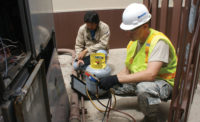CUSTOMER CONNECTIONS
Tri-City Mechanical, formerly Tri-City Air Conditioning, has expanded its service offerings to include the design-build, new construction, maintenance, service, retrofit, and fabrication arenas."Our goal as a design-build company is to build a relationship with our customers at the beginning of a job and continue it well into the future," said Joe Nichter, president of Tri-City Mechanical. "The foundation for this type of relationship begins with trust as the cornerstone."
Throughout the years, the team at Tri-City has worked to be more than just a typical HVAC contractor. When developing the HydroKool system, Tri-City researched the specific needs of its customers.
"As a result, we think our unique concept of providing the complete plant, including the tower, all associated piping, and startup is out-of-the-box thinking," said Nichter. Pun intended.

CHILLER CHECKUP
HydroKool chillers are a modular water-cooled central cooling plant that is skid mounted. Chillers, pumps, controls, heat exchangers, drives, and water treatment are all mounted on a skid that is shipped directly to the jobsite ready to set and start in a single day. Tri-City also ships the cooling tower skid and provides piping to connect to the tower. It is possible that when the system arrives at the jobsite, it can hook to a single point power connection, supply, and return from the building's current system, and a make-up water supply, immediately."If all this is ready and available, the owner will have his central plant running the same day as shipping," commented Nichter. "We operate our plant no differently than any building-housed central plant."
The HydroKool can be set up remotely as a modular structure or roof mounted. There is no need to build a structure to house the chiller. Maintenance access is gained through a full sized roll-up door. The double-wall side panels and roof structure can be removed.
HydrolKool currently uses a selection of manufacturers to provide modules that offer sizing from 100 (1 module) to 2,500 (4-5 modules) tons. The current modules use Carrier or McQuay chillers, Armstrong or Paco pumps, and Victaulic fittings.
Each module and skid is designed to accept this equipment and to provide up to 600 (max) tons of cooling. If additional capacity is needed, an additional module can be added, yielding 1,200 tons of capacity. HydroKool is ETL-listed and the internal equipment is UL-rated. All chillers come standard with a 65,000-amp short circuit withstand ring, and every HydroKool chiller uses R-134a refrigerant.
COOLING CONTRACTS
The HydroKool solution has been accepted in several market sectors, according to Nichter; schools, municipal buildings, clubhouses, resorts, condo projects, and churches are just a few examples.At the Universal Technical Institute, Avondale, Ariz., a 250,000-square-foot auto mechanics training facility, Tri-City installed a 1,100-ton plant consisting of two modules and a separate pumping module. Tri-City also installed a 150-ton single module at the Laughlin Ranch, Laughlin, Nev., a spa and clubhouse. Other installation examples include a 300-ton single module at a 50,000-square-foot electronic manufacturer, White Electronics, Phoenix; a 267-ton single module at Residence on Main, Scottsdale, Ariz., a condominium project; and a 150-ton single module for Santan Chandler Courts, Chandler, Ariz., a municipal courthouse for Maricopa County.
"In bringing our plant to market, we also wanted to provide an economic solution to owners that would make affordability of a central plant within reach of their budget," said Nichter. "Although it [HydroKool] does not match the unitary products in pricing, it is certainly a much cheaper solution than constructing a building to house a plant."
HydroKool is not a traditional rooftop unit. It is, however, a different step towards commercial indoor comfort. "Modular design and prefabrication is the solution of the future," concluded Nichter. "Productivity accomplished in a manufacturing facility achieves the type of labor saving solutions our industry needs."
Publication date: 06/19/2006




